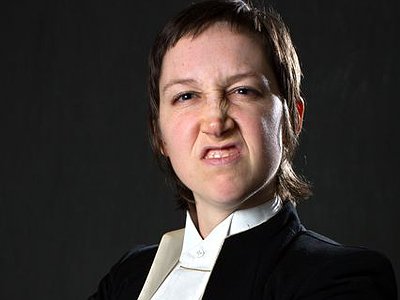Name: Juliet E. Gordon
Nationality: American
Occupation: Musician
Bands/Projects: The Classical
Labels: Time Sensitive Materials
Musical Recommendations: Like A Villain from Portland. Holland Andrews is remarkable / Laughters' album Thoroughly Content vol. 1. It’s so immediate, and has such humour and severity.
When did you start writing/producing music - and what or who were your early passions and influences?
I threw away every song I wrote for five or six years up until I was 19. At that point I finally wrote something I felt was worthy, a song I called “Orfeo.” It was sort of a dark pop song with a backbeat, I was studying Italian Renaissance music at the time which I found inspiring. I played it with my college band Boxy and while I didn’t consciously realise it while writing “Orfeo,” I realised that I'd always been attracted to a sort of palatable dissonance. It’s an addictive sound to me.
I had a fixation with the rap I heard on the radio growing up. I adored Missy Elliott, with that oblique Timbaland production. And even a few years before when Ludacris’ “Fantasy” came on the radio it was like hands around my throat, really. In a good way. It sounded so bizarre to me but it was so easy to fall into—so catchy. It’s amazing that rap has been able to introduce dissonance to mainstream pop music in a way that has never ever happened before, as far as I can tell.
And obviously I have had a good deal of influence since then: James Bond songs, and all that classic mid 20th-century pop crooner stuff; and post-punk acts, like The Fall and The Birthday Party. But recently I have been thinking about how important it is to acknowledge those first things that shocked me.
For most artists, originality is first preceded by a phase of learning and, often, emulating others. What was this like for you? How would you describe your own development as an artist and the transition towards your own voice?
I copied shamelessly for a long time. But I agree that it’s a necessary step for a lot of song writers. Bowie has called himself a “purloiner,” and it’s just that. Borrowing here, copying there, and stitching together this new thing. And it makes perfect sense to work that way when you’re obsessed with dissonance. I feel like I am finally writing songs that are not just laboured copying.
What were your main compositional- and production-challenges in the beginning and how have they changed over time?
Oh man. I’ve told you a little about the way my compositional skills developed, but audio production was where I was really lost for years. I had this great line that I used with my first band, “Why can’t we just do normal production?”
I didn’t realise that there is no “neutral” that somehow favours pure song writing. That’s a no-brainer for a lot of people, but somehow it was a hurdle for me. I had to come to the realisation that even playing a song on your acoustic guitar and singing the words is a production choice, albeit a relatively simple one. In the Aristotelian sense, if you’ll forgive me, there’s no form without matter; the song doesn’t exist if it’s song structure without production.
If you’re going to realise a song you have to make choices about the stuff of it, the sounds that will make up the entire sound. That was a great process of getting out of my head for me, to figure out that production was not the enemy, that it was in fact quite empowering in making a thing real.
Tell us about your studio, please. What were criteria when setting it up and how does this environment influence the creative process? How important, relatively speaking, are factors like mood, ergonomics, haptics and technology for you?
I have a very basic setup for writing—just a little 25-key midi controller and my voice going into a Logic file. Sometimes I substitute an unamplified electric guitar for the midi keys. I can’t have any actual guitar tone going on. Too distracting. So aside from that, I need a clean-ish, quiet room. And it’s best to be home alone, but overall it doesn’t have to be too particular.
Oftentimes I do better when I’m in, say, a friend’s house and they’re gone for the day. Something about the unfamiliar surroundings cancels out distracting thoughts. I’m fairly diligent in that I don’t let something like an unfavourable mood keep me from trying to write some music—or maybe I should say, I no longer let an unfavourable mood keep me from writing. Otherwise I’d make excuses until the end of time.
What are currently some of the most important tools and instruments you're using?
I favour the vocal part above all, and everything else is there to surround and present it. So I have a good condenser mic for singing, but that’s it in terms of particular tools.
Many contemporary production tools already take over significant parts of what would formerly have constituted compositional work. In which way do certain production tools suggest certain approaches, in which way do they limit and/or expand your own creativity? Are there any promising solutions or set-ups capable of triggering new ideas inside of you as a composer?
It is very much my desire as I go forward, to find someone who really knows production to help me get the sounds right. In an ideal world I’d be proficient at it myself, but my focus is more on the side of composition and frankly at this point, while I have day jobs, there aren’t enough hours in the day to become producer extraordinaire. Scott Walker works with an incredible producer named Peter Walsh, for example and I love the ferocious minimalism of Rick Rubin.
I wonder sometimes if I’m limiting myself by not experimenting with more technology. And then I write a great big song with a tiny midi keyboard. But probably next year it will be time for the MPC or something else to change everything around.
Could you describe your creative process on the basis of a piece or album that's particularly dear to you, please? Where do ideas come from, what do you start with and how do you go about shaping these ideas?
I’ll get a few words, a phrase, and it’ll come with a melody, intrinsically. Or it’ll be the opposite of that—I’ll be falling asleep and a melody will pop into my head. No words. The active part of the equation—the difficult part—is taking that little germ and growing it into its finest form.
While it's not mine, I'd like to point to Scott Walker’s “Tilt” as a very dear album. To me, it seems like he wrote the melodies against the bass parts, and everything else came afterwards to support all of that. “Face on Breast,” for example, is a vocal melody, a bass line, and a guitar line—just a line, no chords!—and very skeletal drums. And that’s very much what I do—just poke out a little bass line or countermelody on an unamplified electric guitar, or on the midi controller. It has to start out this pathetically small thing for me, because that’s how I get a good song. Some people get a good song by jamming or playing with textures, but I’ve never been that way.
And once the song is done I bring it to my drummer, Britt Ciampa. He is a huge force in making Diptych work. He gets the song and the process out of my head and makes it tangible. He brings it into the realm of the real.



